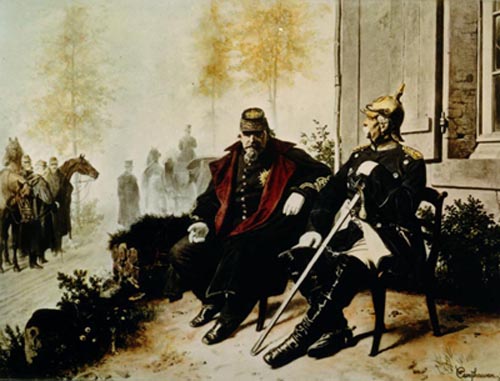A fictional account of Napoleon III surrender to the Prussians during the Franco-Prussian War from Emile Zola's novel La débâcle [The Downfall] (1892)
From among the trees that clothed the summit of la Marfee King William [of Prussia] had just witnessed the junction of his armies. It was an accomplished fact. . . .
The gallant but ineffectual charge of Margueritte's division in its supreme effort to break through the hostile lines at the very moment when the circle was being rounded out had elicited from the king the exclamation: "Ah, the brave fellows!" Now the great movement, inexorable as fate, the details of which had been arranged with such mathematical precision, was complete, the jaws of the vise had closed, and stretching on his either hand far in the distance, a mighty wall of adamant surrounding the army of the French, were the countless men and guns that called him master. At the north the contracting linesmaintained a constantly increasing pressure on the vanquished, forcing them back upon Sedan under the merciless fire of the batteries that lined the horizon in an array without a break. But King William, to give his tired eyes a moment's rest, dropped his glass to his side and continued his observations with unassistedvision. The sun was slanting downward to the woods on his left, aboutto set in a sky where there was not a cloud, and the golden light thatlay upon the landscape was so transcendently clear and limpid that themost insignificant objects stood out with startling distinctness. Hecould almost count the houses in Sedan, whose windows flashed back thelevel rays of the departing day-star, and the ramparts andfortifications, outlined in black against the eastern sky, had anunwonted aspect of frowning massiveness. Then, scattered among thefields to right and left, were the pretty, smiling villages, remindingone of the toy villages that come packed in boxes for the little ones . . . And seen from that height, with thesun's parting kiss resting on it, the horrible battlefield, with itsblood and smoke, became an exquisite and highly finished miniature;the dead horsemen and disemboweled steeds on the plateau of Floingwere so many splashes of bright color; on the right, in the directionof Givonne, those minute black specks that whirled and eddied withsuch apparent lack of aim, like motes dancing in the sunshine, were the retreating fragments of the beaten army; while on the left a Bavarian battery on the peninsula of Iges, its guns the size of matches, might have been taken for some mechanical toy as it performed its evolutions with clockwork regularity. The victory was crushing, exceeding all that the victor could have desired or hoped, and the King felt no remorse in presence of all those corpses, of those thousands of men that were as the dust upon the roads of that broad valley where, notwithstanding the burning of Bazeilles, the slaughter of Illy, the anguish of Sedan, impassive nature yet could don her gayest robe and put on her brightest smile as the perfect day faded into the tranquil evening. But suddenly Delaherche descried a French officer climbing the steep path up the flank of la Marfee; he was a general, wearing a blue tunic, mounted on a black horse, and preceded by a hussar bearing a white flag. It was General Reille, whom the Emperor had entrusted with this communication for the King of Prussia: "My brother, as it has been denied me to die at the head of my army, all that is left me is to surrender my sword to Your Majesty. I am Your Majesty's affectionate brother, Napoleon." Desiring to arrest the butchery and being no longer master, the Emperor yielded himself a prisoner, in the hope to placate the conqueror by the sacrifice. And Delaherche saw General Reille rein up his charger and dismount at ten paces from the King, then advance and deliver his letter; he was unarmed and merely carried a riding whip. The sun was setting in a flood of rosy light; the King seated himself on a chair in the midst of a grassy open space, and resting his hand on the back of another chair that was held in place by a secretary, replied that he accepted the sword and would await the appearance of an officer empowered to settle the terms of the capitulation.
|
